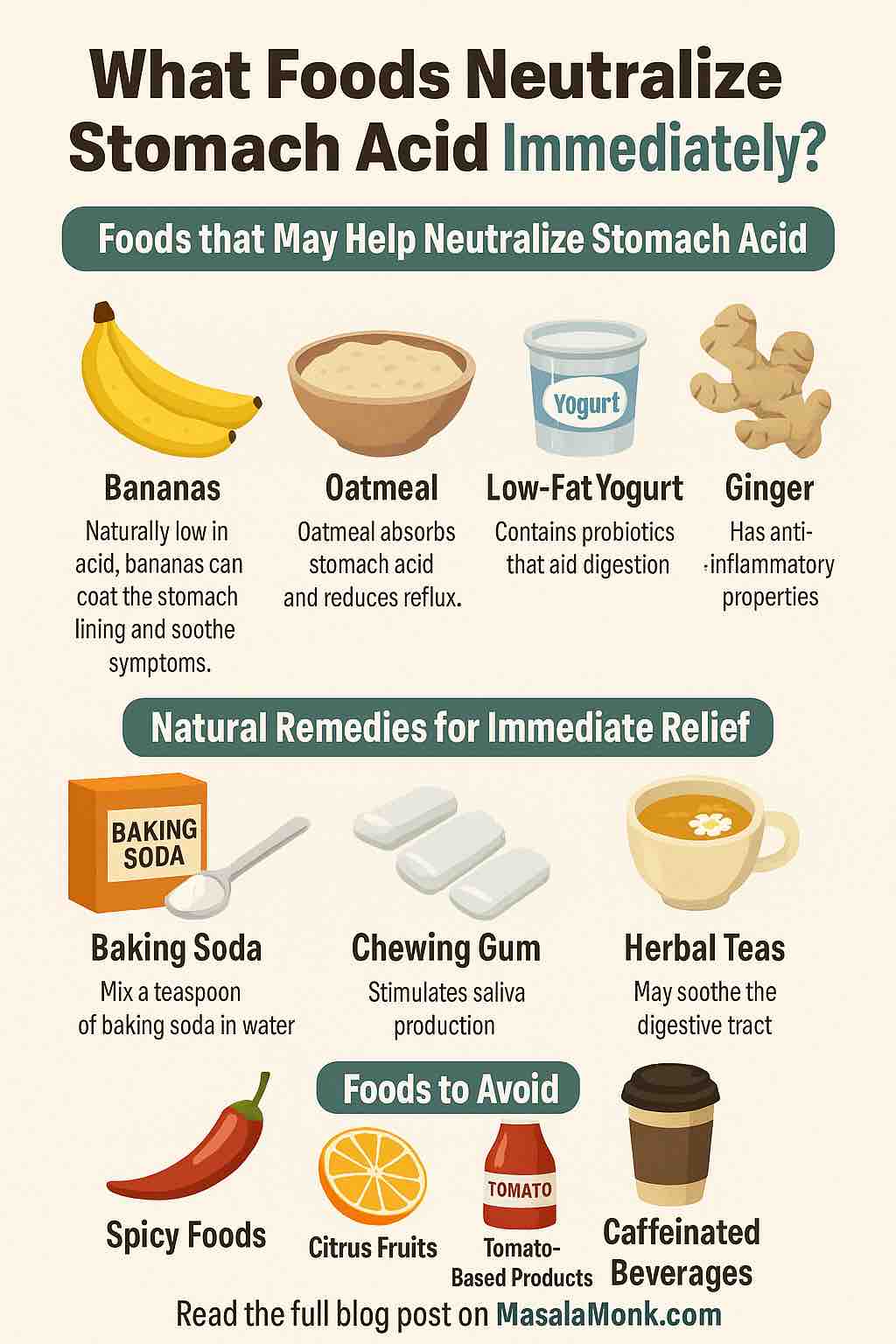
If you’ve ever experienced the burning discomfort of acid reflux or heartburn, you’re not alone. Millions of people worldwide suffer from these digestive disturbances. The good news? Relief may be closer than you think—right in your kitchen! Certain foods can help neutralize stomach acid almost immediately, soothing the esophagus and calming the digestive tract. In this blog post, we explore what foods can help, why they work, and how to incorporate them into your diet.
Understanding Stomach Acid and Its Role
Before we dive into the foods that can offer fast relief, it’s important to understand what stomach acid is and why your body produces it. Stomach acid, primarily hydrochloric acid (HCl), is essential for digestion. It helps break down food, activates digestive enzymes, and protects against harmful bacteria. However, when the acid level becomes excessive or backs up into the esophagus, it can cause discomfort, burning sensations, and even damage to the esophageal lining.
The Fast-Acting Food Heroes
Here are some scientifically backed and widely recommended foods that can neutralize stomach acid quickly:
1. Bananas
Bananas are naturally low in acid and rich in pectin, a soluble fiber that helps food move smoothly through the digestive tract. Their soft texture and soothing effect make them one of the best go-to snacks when acid reflux strikes. They also help coat the lining of the stomach, offering a protective barrier against acid.
2. Oatmeal
A staple breakfast food, oatmeal is not only filling and nutritious but also incredibly gentle on the stomach. Its high fiber content absorbs stomach acid and reduces reflux symptoms. Plus, it doesn’t trigger acid production, making it ideal for those prone to heartburn.
3. Low-Fat Yogurt
Yogurt contains probiotics, the ‘good’ bacteria that support digestive health. Low-fat or fat-free varieties are preferable since high-fat dairy can aggravate symptoms. Yogurt’s cooling texture can also provide an immediate soothing effect on the esophagus.
4. Ginger
Used for centuries in traditional medicine, ginger has powerful anti-inflammatory properties. It can help reduce nausea, stimulate digestion, and lessen acid production. Try sipping ginger tea or chewing on a small piece of fresh ginger for quick relief.
5. Leafy Green Vegetables
Vegetables like spinach, kale, and lettuce are naturally alkaline, helping to balance out stomach acid levels. They are low in fat and sugar, which makes them less likely to trigger reflux symptoms.
6. Aloe Vera Juice
Often used to soothe skin, aloe vera can also calm the digestive system. Food-grade aloe vera juice can reduce inflammation in the stomach and esophagus, offering a cooling effect and neutralizing acid.
7. Almonds
These small nuts are packed with healthy fats, fiber, and protein. Almonds may help neutralize stomach acid and support a balanced pH level in the stomach. They also make for a convenient, on-the-go snack.
8. Deglycyrrhizinated Licorice (DGL)
A form of licorice that has had the glycyrrhizin removed (to avoid side effects like high blood pressure), DGL is known to increase mucus production in the stomach lining, protecting it from acid damage.
Quick Natural Remedies
Aside from specific foods, there are a few quick and simple remedies that can offer immediate relief:
- Baking Soda and Water: A teaspoon of baking soda mixed in a glass of water can neutralize acid almost instantly. However, use this remedy sparingly due to its high sodium content.
- Chewing Gum: Chewing stimulates saliva production, which helps wash away acid in the esophagus.
- Herbal Teas: Chamomile or ginger teas can calm the stomach and reduce inflammation. Avoid peppermint tea, which can worsen symptoms in some people.
Foods and Habits to Avoid
Knowing what to avoid is just as important as knowing what to eat. Common acid reflux triggers include:
- Spicy foods
- Fatty or fried foods
- Chocolate
- Citrus fruits and juices
- Tomato-based products
- Caffeinated beverages
- Alcohol
- Eating large meals or lying down right after eating
Avoiding these can prevent the onset of symptoms and help maintain a healthier digestive tract.
Long-Term Tips for Managing Acid Reflux
While these foods can provide immediate relief, consistent dietary habits play a major role in long-term digestive health. Here are some tips:
- Eat smaller, more frequent meals.
- Maintain a healthy weight.
- Avoid eating 2-3 hours before bedtime.
- Elevate your head while sleeping.
- Stay hydrated throughout the day.
Final Thoughts
Acid reflux and heartburn can disrupt your daily life, but you don’t always need medication to find relief. From bananas to ginger tea, nature offers a variety of solutions that can neutralize stomach acid quickly and safely. Incorporating these foods into your diet not only soothes immediate symptoms but also supports overall digestive health. As always, consult a healthcare provider if symptoms persist or worsen.
Stay informed, eat smart, and treat your gut with care!
✅ FAQs: What Foods Neutralize Stomach Acid Immediately?
1. What causes excess stomach acid or acid reflux?
Excess stomach acid or reflux can be caused by poor diet, overeating, stress, obesity, pregnancy, smoking, or conditions like GERD (Gastroesophageal Reflux Disease). Certain medications can also contribute.
2. How fast do these foods work to neutralize stomach acid?
Many of the recommended foods, like bananas or oatmeal, can begin soothing symptoms within 15–30 minutes, depending on the individual’s digestion and severity of symptoms.
3. Are there any risks to using baking soda for acid relief?
Yes, while effective in small amounts, baking soda is high in sodium and can cause side effects like gas, bloating, and high blood pressure if overused. It’s best used occasionally.
4. Can I drink milk to neutralize stomach acid?
Low-fat or skim milk might provide temporary relief, but full-fat milk can actually worsen symptoms. It’s best to try alternatives like low-fat yogurt.
5. Is ginger safe to consume daily for acid reflux?
Yes, in moderate amounts (1–2 grams per day), ginger is generally safe and beneficial. It can be used in teas, smoothies, or meals.
6. What is the best time to eat these acid-neutralizing foods?
Eat them as part of breakfast, snacks, or shortly after symptoms begin. Avoid eating heavy meals or acidic foods late at night to prevent overnight reflux.
7. Can children eat these foods for acid reflux?
Most listed foods, such as bananas, oatmeal, and yogurt, are safe and healthy for children. However, consult a pediatrician for persistent symptoms.
8. How do I know if my symptoms are due to acid reflux or something more serious?
If you have frequent heartburn, difficulty swallowing, chronic cough, or symptoms not relieved by diet changes, consult a doctor. These could be signs of GERD or other digestive issues.
9. Do spicy foods always trigger acid reflux?
Not for everyone. While many people find spicy foods to be a trigger, others can tolerate them. It depends on your personal sensitivity and digestive health.
10. Can lifestyle changes help more than food alone?
Absolutely. Managing stress, maintaining a healthy weight, avoiding late meals, quitting smoking, and elevating your head during sleep are all proven to reduce acid reflux symptoms.










